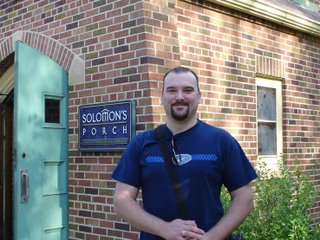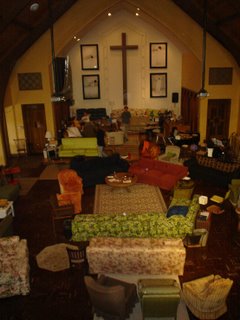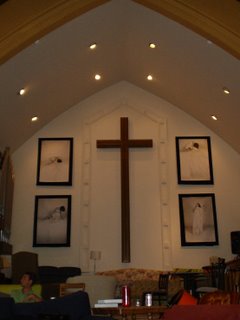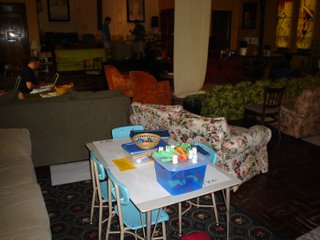
Solomon's Porch currently meets in a rented out old United Methodist Church building. Of course, this is me.

And this is my best friend and co-traveler to the Summer Institute, Jared Coleman (with his ever-present iBook).

One of the things that I became aware of was the concept of implicit theology. Explicit theology is usually pretty easy to determine... it is the stated, obvious beliefs about God and our relationship to him. The implicit theology, however, is subtle, and most people overlook it, while absorbing it subconsciously. For example, as you can see, Solomon's Porch has a bunch of couches, arm chairs, bistro sets, coffee tables, sofa tables, etc in their main "auditorium"... or, the Great Room, as they call it. It was amazing to realize what this arrangement says implicitly about how "church" should be. Church, for this group, is not about some holy, sacred, formal, "special" place where we come to worship; worship should be a part of our everyday lives. The living room atmosphere conveys that when they are together, it is just an extension of their everyday lives. It also stresses the idea of community, particular of family. How different from traditional church arrangements, eh?

In the area that was once the front area, they left the cross, but used some artistic photography by one of the community members to visually display the transformation at the cross. Controversial... yes. Powerful... absolutely. (I highly recommend going to the community's website and going to the gallery section; there you can see more examples of the art there as well as learn more about the artists). Such prominent display of artistic expressions conveys that this is a place were creativity and multiple voices are appreciated.
 Another view of the central area. The "preaching", really, teaching, is given from a stool in the center. Again, the implicit theology behind that could be that no one is more important than another before God, and therefore should be down equal with everyone, not raised like a deity on a platform. They also try to avoid using microphones, at least individual ones, because when only one person has a mic, it implicitly tells you that your voice is unimportant or irrelevant, and only that one person using the mic is important. I never thought about what our environment says about our "theology." It certainly makes me understand the importance of the tabernacle and temple, in terms of the details.
Another view of the central area. The "preaching", really, teaching, is given from a stool in the center. Again, the implicit theology behind that could be that no one is more important than another before God, and therefore should be down equal with everyone, not raised like a deity on a platform. They also try to avoid using microphones, at least individual ones, because when only one person has a mic, it implicitly tells you that your voice is unimportant or irrelevant, and only that one person using the mic is important. I never thought about what our environment says about our "theology." It certainly makes me understand the importance of the tabernacle and temple, in terms of the details. As I understand it, kids stay active in the community, and only leave for "classes" during the sermon. As you can see, such a set up implicitly shares the value of children and the integration of children in community life.
As I understand it, kids stay active in the community, and only leave for "classes" during the sermon. As you can see, such a set up implicitly shares the value of children and the integration of children in community life.  Of course, what would a creative, missional, Christian community be in a late modern, post Christian context without wifi (which Jared -and I- took full advantage of)?
Of course, what would a creative, missional, Christian community be in a late modern, post Christian context without wifi (which Jared -and I- took full advantage of)?
No comments:
Post a Comment